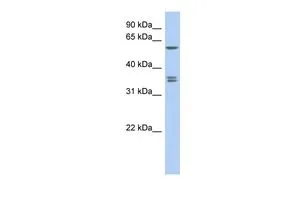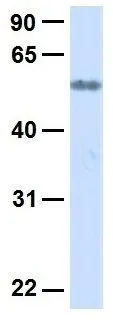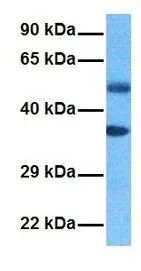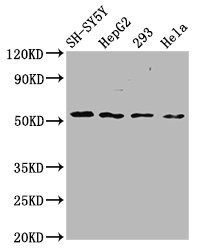
WB analysis of DU145 cells using GTX46980 SLC19A3 antibody at 0.2-1microg/ml.
SLC19A3 antibody, Internal
GTX46980
ApplicationsWestern Blot
Product group Antibodies
TargetSLC19A3
Overview
- SupplierGeneTex
- Product NameSLC19A3 antibody, Internal
- Delivery Days Customer9
- Application Supplier NoteWB: 0.2-2.5 ug/ml. *Optimal dilutions/concentrations should be determined by the researcher.Not tested in other applications.
- ApplicationsWestern Blot
- CertificationResearch Use Only
- ClonalityPolyclonal
- Concentration0.5-1 mg/ml
- ConjugateUnconjugated
- Gene ID80704
- Target nameSLC19A3
- Target descriptionsolute carrier family 19 member 3
- Target synonymsBBGD, THMD2, THTR2, hTHTR2, thTr-2, thiamine transporter 2, solute carrier family 19 (thiamine transporter), member 3
- HostRabbit
- IsotypeIgG
- Protein IDQ9BZV2
- Protein NameThiamine transporter 2
- Scientific DescriptionThis gene encodes a ubiquitously expressed transmembrane thiamine transporter that lacks folate transport activity. Mutations in this gene cause biotin-responsive basal ganglia disease (BBGD); a recessive disorder manifested in childhood that progresses to chronic encephalopathy, dystonia, quadriparesis, and death if untreated. Patients with BBGD have bilateral necrosis in the head of the caudate nucleus and in the putamen. Administration of high doses of biotin in the early progression of the disorder eliminates pathological symptoms while delayed treatment results in residual paraparesis, mild cognitive disability, or dystonia. Administration of thiamine is ineffective in the treatment of this disorder. Experiments have failed to show that this protein can transport biotin. Mutations in this gene also cause a Wernickes-like encephalopathy.[provided by RefSeq, Jan 2010]
- Storage Instruction-20°C or -80°C,2°C to 8°C
- UNSPSC12352203






